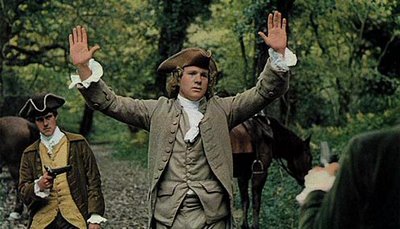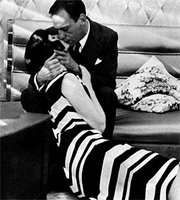Bilge Ebiri
 1. "Praising Arizona,” a review of Raising Arizona by Jack Barth, in Film Comment, March-April 1987.
1. "Praising Arizona,” a review of Raising Arizona by Jack Barth, in Film Comment, March-April 1987.This is a ground zero of sorts for me. I grew up in a family where art films and foreign films were watched fairly regularly, and I had seen my first Fellini, Bergman, and Truffaut films before the age of thirteen. But as much as I loved movies, the true obsession hadn’t gripped me yet. It was this article – which I haven’t revisited in ages – that did it, albeit in a somewhat indirect way. This was a cover story in Film Comment magazine, which my Dad had happened to have left lying around the house back in 1987. One day, after seeing (and loving) Raising Arizona at the theater, I came home, grabbed this issue and read the article. The article – and this is the only thing I remember from it – at one point compared the Coens’ highly stylized aesthetic to the expressive filmmaking in
 Bernardo Bertolucci’s The Conformist. It just so happened that Dad had also left a VHS copy of The Conformist lying around. I popped it in the VCR. I watched it. Not being able to make head nor tail of it, I rewound it and watched it again. A month later, I had watched the film ten times. The rest of Bertolucci’s oeuvre would follow – along with all the Italian and French cinema that influenced him. To this day, The Conformist is still one of my 3 or 4 favorite films. If it hadn’t been for this article, I may never have seen it.
Bernardo Bertolucci’s The Conformist. It just so happened that Dad had also left a VHS copy of The Conformist lying around. I popped it in the VCR. I watched it. Not being able to make head nor tail of it, I rewound it and watched it again. A month later, I had watched the film ten times. The rest of Bertolucci’s oeuvre would follow – along with all the Italian and French cinema that influenced him. To this day, The Conformist is still one of my 3 or 4 favorite films. If it hadn’t been for this article, I may never have seen it.2. Three books by Robert Philip Kolker: A Cinema of Loneliness, The Altering Eye, and Bernardo Bertolucci
I’m cheating here, not just by including three books as one item, but also because Kolker isn’t really a critic – he’s an academic and a theorist. But his writing to me is the model of how to truly write about film. Reading these books as a young teenager (soon after discovering The Conformist – see above), I found myself in awe of the way Kolker could write about a film by analyzing what was onscreen – shot selection, composition, editing, dialogue, music – instead of going off on his own metaphysical tangents.
3. Pauline Kael on The Leopard
 Reviewing movies I love can be tough. How to make effusive enthusiasm interesting to a reader without sounding like a broken record? Even though she was notorious for all the films she panned, I can’t help but think of Pauline Kael’s impassioned review of Visconti’s The Leopard, which makes it look so easy. I wish I could include a quote, but all my books are in storage right now.
Reviewing movies I love can be tough. How to make effusive enthusiasm interesting to a reader without sounding like a broken record? Even though she was notorious for all the films she panned, I can’t help but think of Pauline Kael’s impassioned review of Visconti’s The Leopard, which makes it look so easy. I wish I could include a quote, but all my books are in storage right now.4. “How I Learned To Stop Worrying And Love Barry Lyndon,” a review by John Hofsess, in The New York Times, 1976.
This is a review I discovered relatively late, but I’ve always felt it crystallizes perfectly how I feel about some of the pitfalls of film criticism – the notion of articulating in words what, in some senses, is a fundamentally non-verbal experience. I wasn’t around for Barry Lyndon’s panning by critics at the time of its release, but it was exciting to discover that some cooler heads did exist back then. To wit:
“[T]here isn't much for a verbally-oriented person to chew on. There's no conceptual or discursive aspect, no kernel of pop sociology or philosophical nutmeat. It isn't at all like Nashville or Last Tango in Paris, where a knowing reviewer could write the kind of richly allusive in-depth analysis that critics have long done for novels. Instead, Barry Lyndon throws down the gauntlet to those film critics who are really literary or drama critics in disguise and tests their ability to appreciate qualities of form, composition, color, mood, music, editing rhythms-- among other cinematic qualities that generally do not greatly interest them. Words are a film critic's primary tools and when a movie doesn't lend itself to verbal translation-- discussions about character, ideas, values, plot development, and so on--many critics are inclined to dismiss it as unimportant or as a failure.”
 5. Hitchcock: The First Forty-Four Films, by Eric Rohmer and Claude Chabrol
5. Hitchcock: The First Forty-Four Films, by Eric Rohmer and Claude ChabrolTwo of the greatest filmmakers of all time writing about another great filmmaker. Rohmer and Chabrol’s book has almost none of the discipline of Kolker (see above) and little of the filmmaking insights of Hitchock-Truffaut. But it’s an amazing book nonetheless: A chance to witness two of the greatest cinematic minds of the 20th Century fully engage themselves in tackling – on all levels -- one of the most astonishing directorial outputs ever. I like to reread this every couple of years.
_________________________________
New York-based critic Bilge Ebiri is the editor of Screengrab.

13 Comments:
I've read Cinema of Loneliness a bunch of times, and I think it's the only "academic" book that I've ever given to someone as a present.
Funny you should say that -- not only have I given it as a present myself, I actually gave my own, heavily underlined copy to an actor friend and am now wishing I hadn't, since now I have to buy another copy and highlight all my favorite passages all over again.
One has to be careful giving away old copies of Cinema of Loneliness, since Kolker has been known to boot entire chapters on filmmakers from his survey. He famously gave Coppola the boot after the first edition, replacing him with Spielberg for the second one. I still only have a photo-copy of his chapter on Coppola.
Bilge, I discovered Kolker just this year and I absolutely love his writing: lucid, light on the jargon, but packed with insights. Also, I realized that The Altering Eye is available on-line in its entirety.
I also picked up cheap & used on Amazon a terrific, more recent book by him called Film, Form & Culture. Posted a little excerpt from it here/. It's a slim intro text but Iearned a lot from it.
Bilge: Thanks for reminding me of the Kolker books. I have only read A Cinema of Loneliness, but it's always been one of my favorites, written about a period and about directors who were (and largely still are) of major interest at the time the book came out. I look forward to reading the other two.
And that's a wonderful story of how the most unlikely films can lead to even unlikelier destinations, in terms of appreciation. I doubt too many people have ever linked Raising Arizona and The Conformist in their heads, but I bet there are lots of similar stories of one good thing leading to another good thing that you'd never have thought of before.
It's so great to see that Kolker has so many fans hereabouts. For some time I thought I had merely imagined his work. There's a large chunk of film criticism (and filmmaking, obviously) that disdains academic work in general, but Kolker's work is so grounded in what's actually onscreen that it's hard to deny his observations, some of which are breathtaking.
I have a Kolker Story: When I was a senior in high school in DC, we had these senior projects we had to do as a requirement for graduation. Most of the other guys in my class did stuff like interning somewhere for a few weeks, etc. I decided I was going to hunt Kolker down -- he was teaching at the University of MD, conveniently -- and make him my project advisor and write a monograph on the films of Bertolucci.
I went and found him, and he initially seemed perplexed to find this high school kid who had read his stuff backwards and forwards. But he eventually decided it would be kind of cool. Anyway, he was a nice guy, very opinionated -- and he had, as it turned out, kind of soured on Bertolucci after the one-two punch of THE LAST EMPEROR and THE SHELTERING SKY. (God knows what he later thought of LITTLE BUDDHA.)
He tried very hard to get me to do something on Michael Powell instead, but I resisted. I did wind up doing Bertolucci, but I'll always remember that Kolker was the first person to really turn me on to Michael Powell, who would some years later become another one of my favorite filmmakers.
I'd not read that Hofsess article before... it's really quite interesting...
Manohla Dargis echoed some of its themes in an interview with Steve Erickson in Senses of Cinema that might make my own "5 For the Day:"
Even reviewers who are somewhat more ambitious than the average hack tend to write about movies as if they're reviewing books. They pay very little if any attention to the specifics of the medium, to how a film makes meaning with images – with framing, editing, mise en scène, with the way an actor moves his body in front of the camera. To read most film critics in the United States you wouldn't know that film is a visual medium.
It's not just the depth of a critic's analysis that distinguishes a good review, it's the appropriateness of his or her observations...
Hofsess question to Kubrick, about whether Kubrick had learned anything from reading reviews of his films, is fascinating. For that question to make sense you have to assume a great deal--about who reviews are for, about the extent to which reviews are or are not criticism, about the function of film reviews and of film criticism. Depending on what you choose to assume you can read the question in a wide variety of ways, leading to an array of interpretations of the sigificance of Kubrick's response...
Ironically enough, good book criticism itself will also engage its subject matter in terms of form and language. A person who reviews a film without taking into account the nature of its visual expressiveness isn't merely a book critic posing as a film critic -- they're a *bad* book critic posing as a film critic.
What's weird, tho, is how lazy a lot of literary critics are, praising a lot of lazy writing as poetic. The most damnable being Cormac McCarthy's work since the 90s. The tropes he uses and invokes are downright silly. What kind of cowboy is going to revel in the magesty of a horse moving its bowels with thunderous droppings? It's a drunk cowboy staring bleary-eyed at his horse shitting in the sand and mesquite. Why gussy it up with all that messy nonsense if only to distract and hold an authorial power over the readers? I guess somebody could pick apart the academic-minded elitism in Tarkovsky's or Kubrick's films, too, but by nature of being moving pictures they engage the viewer-critic-fan on a different level and both those men created a bounty of indelible images I, for one, cannot shake.
Amazing how often "poetic" turns out to be a synonym for flowery language or purplish touches. Seems to me the only proper way to use it is in reference to structure or the arrangement of imagery -- i.e., filmmaking that pushes against commercial narrative norms, and demands imaginative as well as emotional engagement from the spectator, to the point where he or she is actively helping to complete the movie in his or her own head.
Great Kolker story, Bilge. I can tell he has strong opinions from The Altering Eye, but (and here's one mark of a great critic) he stimulates and enriches your understanding even as you disagree with his opinions. Not too many critics can pull that off...
Matt, I'm with you 100%.
Why is the world won't I be able to see INLAND EMPIRE?!!?!?!!
I came across this blog while trying to Google an old Film Comment article, and had to write in. After writing that piece for FC those many years ago, I got a furious letter from some aesthete hugely offended that I dare mention the upstart Coens in the same breath as the immortal Bertolucci. Of course, the intervening years have proved the Coens not only Bertolucci-worthy, but most would say they've surpassed the master. Thanks for the recollection. Yer pal, Jack Barth
Post a Comment
<< Home